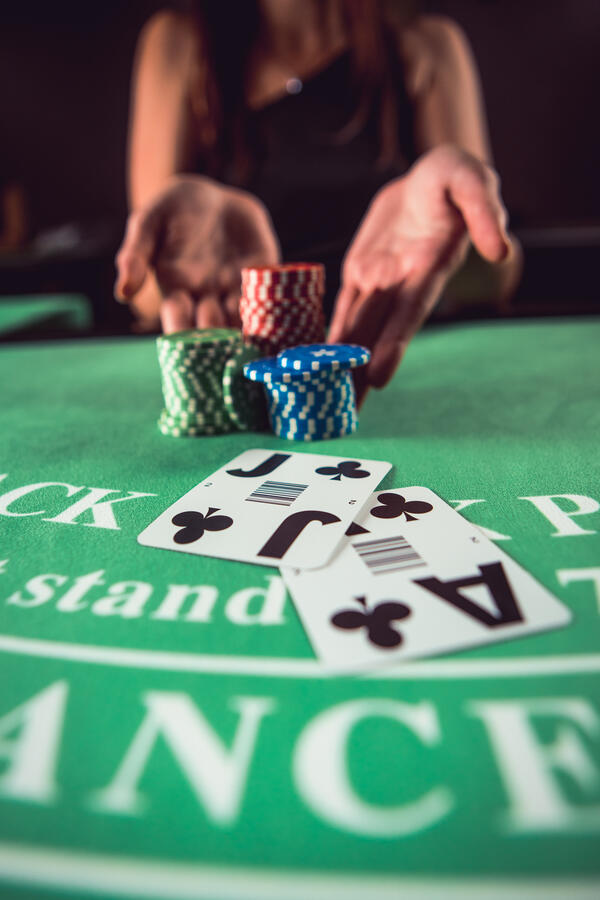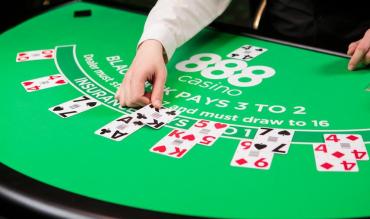What is the blackjack insurance bet?
This article focuses on the insurance bet in blackjack, specifically:
- The purpose of the insurance bet
- When and how to make the bet
- The odds and payoffs
- The facts on whether it is a good bet for players
The insurance bet in blackjack seems to confuse most players. They either don’t understand what the bet is all about or, worse, they always make the insurance bet when the dealer offers. This article takes the mystery out of this bet and offers advice on whether you should make it.
Table of Contents
What is the Blackjack Insurance Bet?
After being dealt your initial two cards and the dealer’s up-card is an Ace, the insurance bet comes into play. Before any player can decide on how to play his hand, the dealer will ask the players if they want to make the insurance bet.
It’s an optional and separate side bet in which players must decide if they want to bet that the dealer’s hole card is a ten or picture card. If it is, the dealer will have a blackjack and players who make the insurance bet win.
If the dealer’s hole card is not a ten-value card, the insurance bet is lost.
Amount You Can Wager and the Payoff
When taking insurance bets, casino rules allow players to wager an amount equal to one-half (or less in some casinos) of the original wager on the hand.
For example, suppose you wager $10, the dealer deals the cards, and her up-card is an Ace. Before any player can act on his hand, the dealer asks players if anyone wants to wager on insurance.
The dealer loudly says “insurance” while pointing his finger on the felt and moving it from left to right in front of all players. Players wanting to make the insurance bet place a $5 chip in the insurance line. (see diagram)
If the dealer has a ten or picture card in the hole, which gives him a blackjack, the insurance wager is paid at 2 to 1 odds. Therefore, in the above example, the $5 insurance bet would win $10.
Note: In the above example, even though you would win $10 for your insurance bet, your original $10 that you bet on your hand would automatically lose to a dealer’s blackjack.
In the case you also have a blackjack, then it’s a push, meaning you neither win nor lose. Since you won $10 on your insurance wager but lost $10 on the hand, your net is zero.

Why Do Casinos Offer the Insurance Bet?
This insurance side bet was introduced into the game of blackjack to give the perception to players that they can “protect” their hand against a dealer getting a blackjack. It seems logical, however there are a few facts that the casino doesn’t tell you about their insurance bet.
- Despite what the casinos would have you believe, the blackjack insurance bet is strictly a side bet that has nothing to do with increasing or decreasing your chances of winning the original bet.
- When you make the insurance bet, you are betting solely that the dealer’s hole card is a ten or picture card. So in fact, you are not insuring anything.
- The insurance bet is a sucker bet, worthy of no consideration if you are a smart basic strategy player.
Point number three above is a very strong recommendation that requires a little more explanation (with simple math) to prove why you should never take the insurance bet.
Simple Math of the Insurance Wager
If you were offered an opportunity to wager on a flip of a coin (heads or tails), winning even money if you guess correctly and losing your original bet if you guess wrong, would you play?
What about playing this coin-flip game? You lose your original bet if you guess wrong, and win 95 cents for every dollar you wagered if you guess right.
If you were forced to play one of these two games, which would you choose? I hope you chose game one above and not the second option for this reason: the odds that the outcome of a coin-flip will be either heads or tails are 50-50.
Likewise, the payoff has the same payoff odds, meaning half the time you win even money and half the time you will lose your original bet. So after thousands of coin-flips, you’ll be very close to even, and neither the coin flipper nor the player has an advantage.
However, game two isn’t an even game because you’re being paid less than even money on each winning coin flip – 95 cents instead of $1 per wager. The point of this example is this: a bet becomes disadvantageous to a player when the payoff odds are less than the true odds of winning.
With that thought in mind, let’s look at what the odds are of a blackjack dealer having a ten or picture in the hole. For simplicity, I’ll use a single deck of cards for the following example and assume the player bets $1 on insurance.
The ratio of non-tens to tens in a single deck of cards is 36 to 16. There are four tens, four jacks, four queens, and four kings or a total of 16 tens.
After the cards are dealt on the first round, let’s assume that the dealer is showing an ace and asks if you want to take insurance. If we ignore for the moment the composition of the two cards in your hand, then the ratio of non-tens to tens in the unplayed 51 cards is 35 to 16. This means:
- 35 times that we made a $1 insurance bet, we would lose a total of $35 (the times the dealer wouldn’t have a ten in the hole)
- 16 times, he’d have the ten in the hole and we would win – 16 x $2 = $32.
The net loss after making $51 of insurance bets is $3. (Lose $35 and win $32.)
The disadvantage by making the insurance bet is $3 divided by $51 or 5.9%. This means the house edge on the bet is 5.9%.
The reason the casino has an edge is that the payoff odds for a winning insurance bet are less than the true odds of having a ten in the hole. For the above to be an even game, the casino should pay $2.19 for a winning insurance bet but instead pays less ($2), which creates the house advantage.
What About Insuring a Good Hand?
Some players reason that taking insurance on a 20 will help avoid losing money on a good hand should the dealer end up with blackjack. Also, even if the dealer doesn’t have blackjack, she’ll still have a tough time beating a 20. So blackjack insurance makes sense, this thinking goes.
However, the facts are this. Taking insurance when you hold a 20 is an even worse bet than taking insurance when you have a “bad” hand.
Here’s why. If you have a 20 made up of two ten-value cards, you’ve taken out of play two of the cards the dealer needs for his hole card to have a blackjack.
Therefore, in our previous example, the ratio of non-tens to tens in the remaining 49 cards is now 35 to 14. You’d end up losing $7 out of $49 worth of insurance bets for a whopping house edge of 14.5%. This is the worst possible time to consider making the insurance bet.
What About Taking Insurance if I have a Blackjack Hand?
That is a very good question since if the dealer has an ace up-card when you have a blackjack hand, the dealer will ask if you want “even money.” The latter takes some explanation, which I will do in my next article on “Blackjack Even Money.” Stay tuned and, in the meantime:
- No matter how you look at it, blackjack insurance is a bad bet for a basic strategy player because it has a negative expected value (EV). You’ll lose money in the long run. Avoid making this bet!
One additional note: There are instances when the insurance bet is profitable, specifically, when the remaining decks contain an abundance of ten-value cards. When this occurs, the dealer is more likely to have a ten in the hole.
Card counting is a tool that allows you to know when the abundance of tens occurs. Therefore, the insurance bet can be a profitable bet for card counters. For details on this, consult Chapter 10 in my Ultimate Blackjack Strategy Guide.
